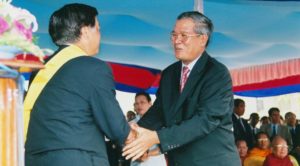IDJ ENGLISH Need for support to build a stable federal democracy
Need for support to build a stable federal democracy
Compromises with the military are unlikely, negotiations are still necessary
Professor Toshihiro Kudo,National Graduate Institute for Policy Studies (GRIPS)
The military coup d’état in Myanmar on the first day of February shocked the world. In particular, the impact on Japan, which has been providing huge amounts of Official Development Assistance (ODA) and private investment is large. Professor Toshihiro Kudo of the Graduate Institute for Policy Studies (GRIPS), who specializes in Myanmar studies, speaks out on the background of the coup d’etat, perspectives for the future, and the role of Japan.
(Interviewer: Yukifumi Takeuchi. This interview was held on March 15, 2021)
The Source of Aung San Suu Kyi's Power
--Why did the military coup take place?
In order to understand the background, it is necessary to look back at the history of the "transition to civilian rule " which took place in 2011 from the former junta that had lasted 23 years. Until then, Aung San Suu Kyi, the National League for Democracy (NLD) and student movement organizations had been thoroughly oppressed.
Conservatives, the military's mainstream, had no intention of transferring power to Suu Kyi and tried to remove her, but were unable to easily do so.
Suu Kyi has two sources of power. One is her charismatic popularity amongst the public. The other is the influence on the international community, especially the United States. Reformists in the junta sometimes acted as intermediaries, discussing with Suu Kyi to strike a deal. After lifting her house arrest, Suu Kyi resumed her political activities. Then the military eventually began to say she had committed a violation of her promises, and they also strengthened restrictions and repeatedly put her under house arrest. What happened this time is almost same as before.
President Thein Sein , who was borne of the civil government transfer, had been the fourth in the ranks of the junta and was prime minister when it was controversial as to whether Myanmar should accept the international community's relief during the cyclone of May, 2008. He realized the need for international cooperation after viewing the sites that had been severely damaged by the cyclone and turned into a reformist. After the retirement of General Than Shwe, who was the most powerful person in the military, Thein Sein was to take charge.
He knew that international sanctions would not be lifted unless he cooperated with Suu Kyi. In 2011, he started political reforms and allowed Suu Kyi to resume political activities. Along with this, investment from developed countries also flowed into the country, and while it was said to be "the last frontier in Asia", the reforms were a great success.
However, in the 2015 general election, the military was disliked by the people and suffered a landslide defeat. As a result, Suu Kyi's government was inaugurated, but there was no backing from the military reformists who protected her. Thein Sein, who invited her to the diarchic national political system stipulated by the 2008 Constitution, did not run in the 2015 general election. Shwe Mann, another one of Suu Kyi’s collaborators with a military background, lost the 2015 general election.
For the next five years, “the divorced couple” gradually lost their conversation instead of fighting and ended up being unable to speak to one another. Suu Kyi also seemed to defend the military on the Rohingya issue, but the military thought she condemned them.
The Panglong Conference aimed at peace-building with ethnic minorities and economic management did not appear to be done well. As the general election approached, Suu Kyi and the NLD criticized the military and used condescending language. After the Commander-in-Chief's speech at the Panglong Conference, Suu Kyi and President Win Myint did not applaud, and they deepened their personal feud.
Even in the 2020 general election, Min Aung Hlaing was likely to have not been aware of inconvenient information. However, when the voting was opened, it was a big loss. Under the constitution, military personnel who hold a quarter of the seats are nominated directly by the commander-in-chief, but the name list of the lawmakers has not been submitted. However, Suu Kyi seems to have forced the opening of parliament and tried to move forward in various ways in the absence of the military personnel.
Meanwhile, Min Aung Hlaing was also scheduled to retire in July this year, so the timing could not be missed. In the long-lasting conflict, the relationship of trust that seemed to have been established through power sharing collapsed.
The Spreading Civil Disobedience Movement (CDM)
---What are the future perspectives of the military?
The military had tried to show its ability to govern during the state of emergency for one-year or so. They would like to demonstrate better governance capabilities than the NLD in their measures against COVID-19, ceasefires with ethnic minorities, and economic policies that attract foreign capital. In the meantime, they would convict Suu Kyi and make it impossible for her to run election, weaken the NLD, and return to power by elections that favor the military.
However, a large-scale anti-government movement, including the civil disobedience movement (CDM), has occurred, and the scenario of the military is collapsing. If this situation continues, the economy will be paralyzed, and the people will be in dire straits.
Security has also deteriorated, and anti-junta sentiment is growing more and more. It is the young people from relatively poor areas who are mobilized into streets. Many say they are willing to fight to the death, and many young people have died after being shot. The military had crossed the redline.
The CDM was started by doctors. Many of them work for the Ministry of Health and public hospitals under the ministry, but they lack medical resources and have been working hard since last year in response to the COVID-19 pandemic. The coup d’état occurred when the pandemic became worst. Even if they abandon their patients in hospital, they are so angry to have to go to protest.
In addition, staff of Ministry of Railways also participate in CDM. There were a lot of golden parachutist from the military in the upper management of the ministry, and many are dissatisfied with such a situation.
On the other hand, the military will not give up easily either. Although there have been reports that many police and security officials are participating in the CDM, there have been no indications of a split in the military.
---How do you evaluate the results of economic development in the 10 years since the power transfer to the civilian government?
Infrastructure such as roads has been improved. Entering Myanmar from the Thai border, in the 1990s, the Burmese language was not used at all. But since the 2000s it has come to be quite popular. Locals say it has "changed from traditional Karen rule to central government rule." Schools and government offices have been built even near the border, Myanmar flags have been raised. It seems that they have integrated the border area.
On the Rohingya issue, most of the Myanmar people said they were illegal immigrants and that they should leave, and they did not think that the military was causing problems, even if they did bad things. Suu Kyi is also a politician, so she didn't speak out in support of the Rohingya. But now, some citizens, who have been repressed by the military, started to say "We were wrong. We want to apologize to the Rohingya."
On the military's behavior in ethnic minority areas, they said, "We didn't know. Many young people realized that they were also the unconscious perpetrators." It could also be a catalyst for a single Myanmar identity beyond different ethnic groups, religions, and regions.
Myanmar using China
---What do you think of China's position?
This coup is not a happy scenario for China. Certainly, it had a very close relation with the military. But the quality of economic assistance has been low, and there were many failed Chinese projects. Recently, China has also learned how to invest foreign investment in Myanmar, drawing a plan for the "China-Myanmar Economic Corridor" in the Belt and Road Initiative.
Although anti-China sentiment intensified among Myanmar people during former Thein Sein's administration, President Xi Jinping visited Myanmar last year to try to restart with the Suu Kyi government. There is a strong view that Myanmar is being mistreated by China, but Myanmar has also been using China recently.
―What do you think about Japan's role?
It is necessary to put pressure on the military to stop their violence towards people. The military pointed to illegal elections as a cause for the coup, and they say they will set up a free and fair election again. This is very different from the military regime of the 1990s. However, it is impossible for the military to hold another general election because the people are very angry and opposed. So how about working with the Association of Southeast Asian Nations (ASEAN) countries to support it, including holding a free and fair election?
After the renewed election organized by ASEAN, whoever wins or loses, the military has to return to the barracks, seceding from national politics. This is something unthinkable for many Myanmar people now. Nevertheless, I think we need to support Myanmar to create democracy with a stable federal system through negotiations with the military.
International Development Journal, 2021 May edition
*****以下、日本語原文*****
ミャンマー特集
工藤年博・政策研究大学院大学(GRIPS)教授に聞く
安定した連邦制の民主主義築く支援を ―安定した連邦制の民主主義築く支援を
2月1日にミャンマーで起きた軍事クーデターは世界に大きな衝撃を与えた。中でも、巨額の政府開発援助(ODA)と民間投資を注ぎ込んできた日本の痛手は大きい。政変の背景と今後の見通し、さらに日本の役割について、ミャンマー研究を専門にする工藤年博・政策研究大学院大学(GRIPS)教授に聞いた。(聞き手:本誌編集委員・竹内 幸史)
スーチー氏の力の源泉
--軍事クーデターはなぜ起きたのでしょうか。
背景を理解するには、23年間続いた旧軍政から2011年に「民政移管」が実現した経緯に遡る必要がある。それまでアウン サン スー チー氏や国民民主連盟(NLD)、学生運動組織は徹底的に弾圧されてきた。軍の主流である保守派は、スー チー氏に権限を移譲するつもりは全くなく、彼女を排除しようとしたが、なかなかできなかった。
スーチー氏には力の源泉が2つある。1つは国民の間でのカリスマ的な人気。もう1つは、国際社会、特に米国への影響力だ。軍政の中の改革派が仲介役になり、スー チー氏と話し合ってディールをした。自宅軟禁を解いては、やがて約束違反だと言い始め、また制限を強め、自宅軟禁を繰り返した。今回の動きも大きな意味ではその延長だ。
民政移管で生まれたテイン セイン大統領は軍政の序列4位で、08年5月のサイクロンの際、国際社会の救援を受け入れるかどうかもめた時の首相だ。甚大な被害を受けた現場を目の当たりにして国際協調の必要性を実感し、改革派に変わっていった。一番の権力者だったタン シュエ氏らが引退後、テイン セイン氏が仕切ることになった。彼はスー チー氏と協力しない限り、国際社会の制裁が解けないと分かっていた。11年から政治改革を進め、スー チー氏の政治活動再開も認めた。これに伴い、先進国からの投資も入り、「アジア最後のフロンティア」と言われ、改革は大成功した。
ところが、15年の総選挙で国軍は国民に嫌われ、大敗した。その結果、スー チー政権が発足したが、彼女を守る国軍改革派の後ろ盾もなくなった。そこから5年間、離婚する夫婦が喧嘩をするのではなく、徐々に話をしなくなり、最後は口もきかなくなるような状況になった。ロヒンギャ問題でも、スー チー氏は擁護しているように見えたが、軍から見れば非難されていると思っただろう。少数民族との和平を目指したパンロン会議も、経済運営もうまくできないと思われた。総選挙が近づくと、スー チー氏やNLDが軍を批判し、見下す言葉遣いもした。パンロン会議では司令官の演説後、スー チー氏らは拍手もせず、知らんぷりをして個人的確執も深めた。
20年の総選挙でも、フライン氏には都合のいい情報しか上ってこなかったのだろう。負けてもテイン セイン時代に戻る程度だと言われていたのではないか。ところが、ふたを開けたら、ぼろ負けだった。憲法の規定上、議席の4分の1を占める軍人議員は司令官から直接指名されるが、この議員名簿は未提出だった。しかし、スー チー氏は議会開会を強行し、軍人議員不在の中でいろいろ進めようとしたようだ。一方、フライン氏も今年7月で引退予定なので、タイミングを逃せない。長く続く対立関係の中、パワーシェアリングで成立したと思われた信頼関係は崩壊した。
広がる市民不服従運動(CDM)
---国軍の今後の思惑はどうですか。
国軍は、1年程度の非常事態宣言の間に自分たちの統治能力を見せようとしている。新型コロナウイルス対策、少数民族との停戦、外資を呼び込む経済政策などでNLDより優れた統治能力を見せたい。その間にスー チー氏に有罪判決を出して選挙に出られないようにし、NLDも解党するなど弱体化させ、国軍に有利な選挙をして政権を取り戻したいのだろう。
ところが、市民不服従運動(CDM)を含めて大規模な反政府運動が起き、国軍のシナリオが崩れつつある。この情勢が長引くと、経済が麻痺し、人々が困窮する。治安も悪化し、ますます反軍政感情が募る。動員されているのは比較的貧しい地域出身の若者だ。「死ぬまで戦う」と言っている人が多く、多数の若者が撃たれて亡くなっている。
CDMは医師らが始めた。多くは保健省や傘下の病院に勤めているが、医療資源が足りない上、昨年からコロナ禍対応で大変な勤務を続けてきた。へとへとになったところでクーデターが起き、「もうやってられるか」という感じになった。自分の病院の患者を見捨てても、抗議に行くという怒り具合だ。また、鉄道省職員もCDMへの参加は多い。上層部に軍からの天下りが多く、もともと不満があったのだろう。
一方、軍も簡単に降参しはしないだろう。市民不服従運動(CDM)に参加する警察や治安当局の人が増えているとの報道もあるが、軍が割れるほどの動きはない。
---民政移管から10年の経済開発の成果をどう評価しますか。
道路などのインフラがある程度、整備された効果が出ている。タイ側の国境から入ると、1990年代はビルマ語が全然通じなかったが、2000年代以降、かなり通じるようになった。地元の人は「従来のカレン族の統治から政府の統治に変わった」と言う。国境付近まで学校や役所ができ、ミャンマー国旗が立ち、国境地域まで一体化してきたようだ。
また、ロヒンギャ問題については大半のミャンマー人が「不法移民であり、出て行って当然だ」と言い、軍が悪いことをしても問題にしなかった。スー チー氏も政治家だから、ロヒンギャ寄りの発言をしない。だが今、国軍の弾圧を受けた市民の間に「自分らが間違っていた。ロヒンギャに謝りたい」という人もいる。少数民族地域で国軍がやってきたことについて、「自分たちは知らなかった。無自覚な自分たちも加害者だった」と気付いた若者も多い。民族や宗教、地域を越えて一つのミャンマー国民というものが誕生するきっかけになる可能性もある。
中国を利用するミャンマー
―中国の立場をどう思いますか。
決して中国にとっては今回のクーデターはハッピーなシナリオでない。確かに軍政時代は非常に密接な関係にあったが、経済援助の質は低く、雲南省の事業など失敗ばかりしていた。最近では中国も対外投資の手法を学び、一帯一路の中で「中国ミャンマー経済回廊」の絵を描いて進めている。テインセイン政権時代、ミャンマー国民に反中感情が強まったが、習近平国家主席が昨年、訪緬してスー チー政権と仕切り直しを図った。中国にミャンマーがいじめられているとの見方が強いが、最近はミャンマーが中国を利用している。
―日本の役割をどうお考えですか。
とにかく国軍に自制するよう、プレッシャーはかける必要がある。彼らはクーデターの名目・大義として不正選挙をあげ、自由公正な選挙をやり直すという。これは1990年代の軍事政権と全然違う言い分だ。だが、これだけ国民が怒り、反対しているから、国軍が自分たちだけの政権を作るのは無理だ。そこで東南アジア諸国連合(ASEAN)と組んで選挙管理を含めて支援するのはどうだろうか。その代わり、比例代表制を導入し、いろいろな少数民族も含めた機会を作れば、国軍も一応、大義名分は果たせる。
選挙が終わって負けたら兵舎に帰ってもらい、国軍の政治関与は弱めていく。ただ、40万人もいる軍人が社会の中で生きていくには対決姿勢だけでは同じことの繰り返しになる。交渉と妥協を試みながら、安定した連邦制の民主主義にしていく支援が必要だと思う。
『国際開発ジャーナル』 2021年5月号掲載記事



